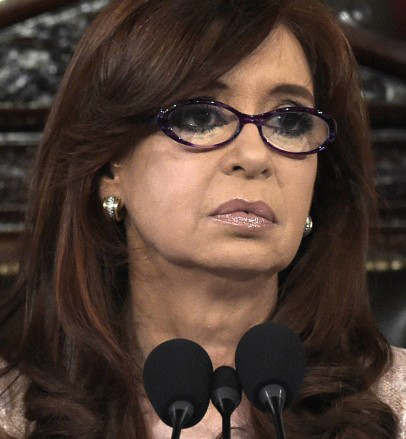
He said that many people tell him that, “It would be best if she ran for office” next year, because putting her in jail now would let her play the victim, claiming political persecution. This would only galvanize her supporters.
Macri immediately distanced himself from that theory. He told me that the fate of the former president should be decided by the justice system, without any interference from his government.
But there may be some truth to the advice Macri is getting. The best scenario for Argentina, according to this theory, would be for the former president not to be sentenced until after the October 2019, elections.
If she remains free and runs for president, she would have to continue going to court to defend herself from the almost a dozen corruption cases against her.
New revelations of cash-filled suitcases that she reportedly received would make headlines every day, as they are now. That would help convince many Argentines that she basically ran an extortion racket for personal profit.
The former president and her late husband, former president Nestor Kirchner, are accused of receiving up to $200 million in cash, brought in suitcases to several of their homes. In addition, they are suspected of hiding or transferring billions of dollars in ill-gotten funds abroad.
What is clearly the biggest corruption scandal in Argentina’s history exploded a few weeks ago, when the daily newspaper La Nacion started publishing copies of eight notebooks filled with notes from a government driver.
Over the course of 10 years, during the 2003-2015 Kirchner governments, the driver, Oscar Centeno, had taken meticulous notes of every trip he had made for his ex-bosses.
At least 70 of those trips were to pick up suitcases packed with cash from private firms and to deliver them to the Kirchners’ homes.
Since the story broke, more than a dozen prominent business executives have confirmed Centeno’s notebook entries, confessing that they, indeed, had handed over the cash-filled bags. And at least two former high-ranking Kirchner government officials have testified that the Kirchners’ were overseeing the racket.
At least $60 million in cash was delivered to one of the Kirchner apartments over a three-year period, one witness said. Prosecutors say they have only begun to unearth the fabulous fortune the couple amassed when they were in power.
If Cristina Fernandez de Kirchner were jailed now, the conversation would shift from her mounting corruption charges to her supporters’ claims that she is a victim of political persecution.
“She is very good at playing the role of the innocent widow,” one person close to Macri told me. “If she’s sent to jail, we’ll be seeing daily pictures of her son and grandchildren parading in front of the jailhouse, begging to see her.”
That could increase her support among undecided voters. Many Argentines have been led to believe by the former president’s propaganda machine that “all politicians steal,” even if there is no evidence that the current president has collected bribery money for awarding major government contracts.
Macri — who will be running for another four year-term in 2019 — has seen his popularity fall following his cuts in government subsidies for electricity, gas and other utilities, and a resurgence of inflation.
He may has erred in not alerting the country forcefully enough about the financially bankrupt government he inherited, and for not taking belt-tightening measures at the beginning of his term. But his pro-investment policies offer the best hope for Argentina’s long-term development.
Of course, the judges overseeing the Kirchner corruption scandals are likely to do what they want, independently of what’s best for Macri.
But perhaps the best scenario for Argentina would be for the current situation to stretch out for a while — with new revelations of Cristina Fernandez de Kirchner’s corruption coming out every day, and with Argentines learning new details of how she amassed millions upon millions while in power. Perhaps that would help make sure that the Kirchner family doesn’t return to power — and that Argentina does not become a new Venezuela.






